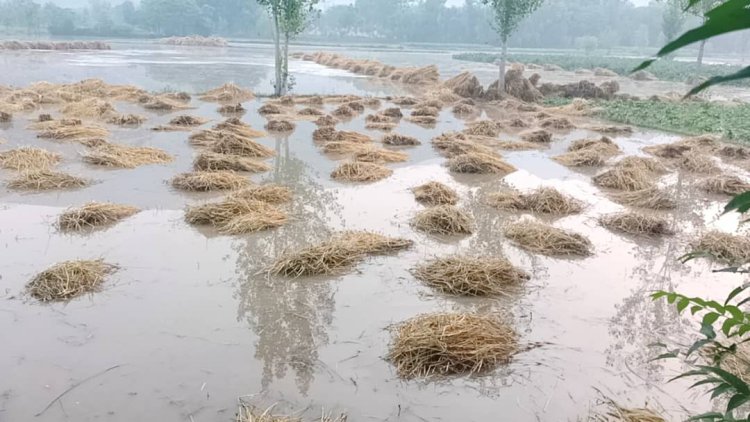The Disaster of Spring Rains: Farmers Deprived of Their Annual Harvest

Nangarhar, located in eastern Afghanistan, is one of the provinces known for its favorable climate for cultivating fresh vegetables, wheat, corn, and other crops. However, local farmers report that despite cultivating abundant crops this year, the recent spring rains and resulting floods have destroyed all their hard work.
Mohammad Nawab, a farmer from Goshta district in Nangarhar who has been farming for over 30 years, said that heavy storms, rain, and floods have completely wiped out his crops. His hopes were pinned on the harvest of wheat and fresh vegetables this year, but rain, hail, and floods crushed those hopes.
He used to provide for his 15-member family through the harvest of his land, but now, with his fields submerged, nothing remains. He expressed despair about how he will now provide for his family. Nawab said:
“I support a 15-member family. This year, I cultivated wheat and fresh vegetables on six acres of land, but rain, hail, and floods buried everything. I've suffered major financial loss. We call for support, as farmers have no other income. This situation is truly painful.”
He noted that this is not the first time floods have destroyed his crops. Last year too, much of his harvest was lost, which led to long-term financial damage. He urged aid organizations to build check dams to prevent flooding. He believes these structures can protect people from floods and also help prevent drought.
Nawab added:
“Every year, floods cause extensive financial loss to people, yet no control measures have been taken. It is essential to manage floodwaters. This can not only protect farmland from floods but also help combat drought.”
He noted that this year’s wheat and vegetable harvests in the province were promising, but unseasonal rains, crop diseases, market inaccessibility, and high transportation costs have posed serious problems. Farmers fear that if the situation continues, their crops will spoil and result in greater losses.
Zainullah, another farmer from Qala-e-Akhund area of Kama district, cultivated sugarcane and fresh vegetables on seven acres of land. The harvest season had just arrived, but like many others, his crops were destroyed. He said without assistance from aid organizations, the yield won’t even cover their costs.
He explained that farmers in Nangarhar were already hit hard by drought, and now, floods and heavy rains have caused even greater damage—so much so that they can’t recover their investment. He said that neither the government nor any aid agencies have provided help.
Zainullah said:
“All our family’s needs were met through this land. We have no other source of income. Immediate financial and other support is essential for affected farmers. If no help is provided, we will face severe hardships.”
He estimated that due to climate change, untimely rains, and floods this year, his wheat and vegetable yields have dropped by half. Farmers are anxious about how to recover their input costs. He warned that without urgent aid for vulnerable families in this province, a major crisis may unfold.
Zainullah added:
“Afghanistan is an agricultural country. Structural solutions must be found for the challenges faced by farmers. They need support in the form of improved seeds, fertilizers, and small loans to keep their work going.”
Another farmer, Masoud, said that due to high transportation costs and fuel prices, he is unable to transport fresh vegetables to other provinces. He stressed that vegetables grown in Behsud district of Nangarhar are high-quality and called on international organizations to assist farmers in distributing their produce.
Masoud said:
“Every year, when our crops are ready, there’s no market for them. Often, we can't even recover our expenses. Many vegetables spoil at home due to the lack of a market. We need cold storage facilities and market access.”
Climate change, unseasonal rains, lack of markets for produce, absence of cold storage, scarcity of improved seeds and fertilizers, neglect by responsible agencies, and frequent closure of transport routes are among the key challenges facing Afghan farmers.
Afghanistan is among the world’s most vulnerable countries to climate change. Irregular rainfall and extreme weather pose serious threats to the agricultural sector, leading to reduced crop yields, poverty, and a growing food crisis. The UN World Food Programme has identified Afghanistan as one of 22 countries at high risk of severe hunger. Support for farmers and investment in essential infrastructure is urgently needed.
